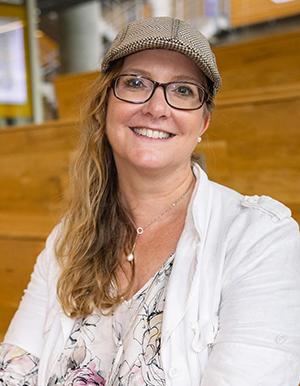
MSE is proud to be led by Natalie Stingelin. A well-respected researcher and academic in the field, Stingelin has risen to her current position as the MSE School Chair not only due to her strong leadership capabilities but also her deep understanding of what makes academia great and how crucial it is to pass these lessons on to the next generation of researchers.
Stingelin was recently invited to become an Associate Editor for the Journal of the American Chemical Society (JACS), joining an international group of editors from some of the world’s most respected academic institutions. Stingelin said she was “thrilled and surprised” to hear she was being extended this honor. As a material scientist, she’s aware of the unique perspective she brings to JACS. “Many material scientists are physical chemists,” Stingelin said. As an expert in polymer research, her connection to chemistry and, therefore, JACS is a strong one; her work with polymers exemplifies this physical chemistry in materials science.
The position as an Associate Editor for JACS is of particular importance to Stingelin because of the esteem she holds for non-profit scientific societies. “Societies such as the American Chemical Society (ACS) are respected because they really, truly support and care for the scientific communities,” Stingelin says. “Science depends on service, that we help and foster each other,” she said. “The ultimate goal is that we all advance science,” and Singelin noted that the service of academics’ peer reviewing for journals like JACS is what allows this advancement to happen.
Journals like JACS are crucial for the next generation of researchers, too. Graduate students and postdocs can experience the unique peer review process without any of the fees that some for-profit journals involve, allowing them to learn and grow their research and writing based on the comments of their reviewers. “You have to address all referees’ comments,” Stingelin said, noting that even if it seems like the reviewer missed something, this is an opportunity for you to better highlight what was overlooked.
With her focus on graduate students and postdocs, it comes as no surprise that mentorship matters to Stingelin. “I always had good mentors, so I want to be a good mentor,” she said. Despite not expecting to end up in a position as School Chair when she first started her academic career, Stingelin is thankful for the mentorship opportunities that this position provides her. “Really mentoring and nurturing other academics, students and researchers, and seeing others to succeed” is her main objective, she said.
“Support letters, nominating younger people for prizes, helping them with writing papers, proposals, going through their written applications and manuscripts whenever I have time,” and more made the list of what Stingelin hopes to provide for graduate students, post-docs, and junior faculty whom she has the opportunity to mentor. And, like many in academia, her mentorship does not end at graduation; continuing to connect and support former students is what drives her.
Is it any surprise, then, that Stingelin hopes her position with JACS will help with junior researchers’ and faculty’s submissions to JACS? Since JACS is so well known, rather than encouraging junior researchers to submit, she hopes to be able to help them know “how to submit or what to submit.”
“I’m super strict with my students when it comes to publishing,” she said. “If an editor looks briefly through a manuscript and the authors didn’t take the time to use the template for JACS,” she explained this could lead to an attitude of why should I even take the time to assess the manuscript?” Stingelin hopes to support her mentees in crafting manuscripts that stand out and align with JACS standards.
Of course, research and publication can only rely on formatting to stand out when the science behind it is strong. The desire to research and figure out the answer to a question is one near and dear to Stingelin. “You always have a puzzle to solve,” said Stingelin of being a scientist. “I think that is the nice part about being a scientist: it never becomes boring. We never get to the end of the tunnel. There’s always something new that we do not understand. This is good and keeps us excited.”
For Stingelin, the peer review process at journals like JACS is what makes this kind of perpetual exploration possible. “People always try new things,” she said, “but the process [of peer review] is the same.” This relationship, to her, is crucial to the survival and advancement of science, because publishing just to publish matters so much less than publishing to participate in the forward progress of the field. Society journals like JACS provide the space for seasoned academics and new researchers alike to present new ideas that advance the field of science.
This focus on quality of research is evident not only in the mentorship that Stingelin provides but also in the leadership she has brought to the entirety of MSE. With labs producing groundbreaking and award-winning research, research projects being awarded prestigious grants, and faculty and graduates alike being honored as leaders in their field, MSE clearly has followed Stingelin in valuing high-quality research that advances the field of science.
As an Associate Editor for the Journal of the American Chemical Society, Natalie Stingelin now represents the School of Materials Science and Engineering on an even more public stage, and we are all proud to have such an accomplished researcher and committed mentor as our chair.